#pakeezah (1972)
Explore tagged Tumblr posts
Text





Pakeezah (1972) | dir. Kamal Amrohi
#pakeezah#pakeezah 1972#kamal amrohi#meena kumari#veena#nadira#indian cinema#hindi cinema#bollywood#cinema#movies#films#world cinema#classic cinema#old bollywood#cinematography#1970s#aesthetics#aesthetic#historical movies#historical films#south asian cinema#asian cinema#indian movies#bollywood movies#hindi movies#indian films#bollywood films#hindi films#cinephile
195 notes
·
View notes
Text
youtube
Mausam Hai Aashiqana | Pakeezah (1971) | Meena Kumari | Raaj Kumar | Lata Mangeshkar
Song: Chalte Chalte Yun Hi Koi Movie: Pakeezah (1972) Actor(s): Meena Kumari, Kamal Kapoor Singer(s): Lata Mangeshkar, Mohd Rafi Music: Ghulam Mohammed Lyricist: Kaifi Azmi
About
Some voices are immortal because they are just heavenly and magical. However, if there is one voice which has reshaped not only Hindi film music but also India’s popular culture and enriched our lives, it is none other than the great Lata Mangeshkar. Famously known as ‘The Nightingale of India’, Lata ji always mesmerised us with her magical & melodious voice for more than seven decades. Her singing for the beautiful & talented heroines down the years has added much charisma to their silver screen personalities and success of the movies as well. Her career actually spanned the arc of Hindi cinema, right from India’s independence. In 1989 the ‘Dadasaheb Phalke Award’ was bestowed on her by the Government of India and in 2001 she was honoured with the ‘Bharat Ratna’. She may have left us for her heavenly abode but she will live in our hearts forever. We celebrate her immense contribution with this special channel dedicated to ‘Lata Mangeshkar: The Nightingale of India’.
#Chalte Chalte Yun Hi Koi#Pakeezah#1971#1972#1970s#Meena Kumari#Kamal Kapoor#Lata Mangeshkar#Mohd Rafi#Ghulam Mohammed#Kaifi Azmi#Raj Kumar#LataMangeshkar#LataMangeshkarHits#Bollywood#Musical#Bollywood Musical#Hindi Cinema#Hindi Music#Dance#Dancer#The Nightingale of India#World Cinema#Dadasaheb Phalke Award#1989#1980s#2001#2000s#zizi jeanmarie#Bharat Ratna
1 note
·
View note
Text
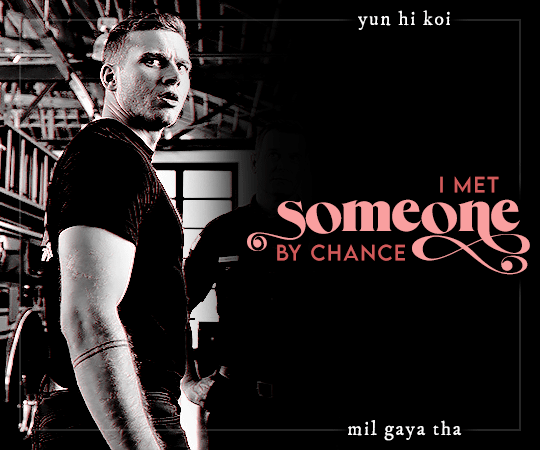
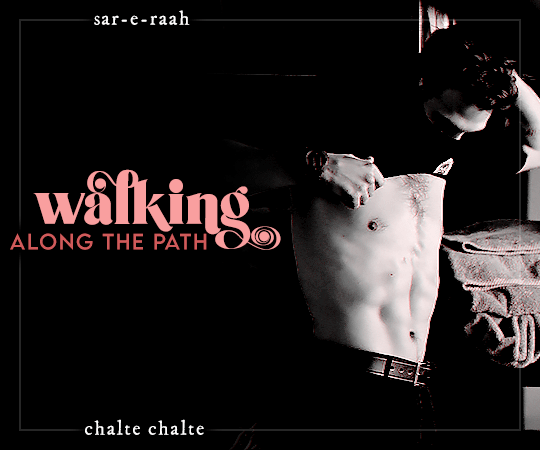
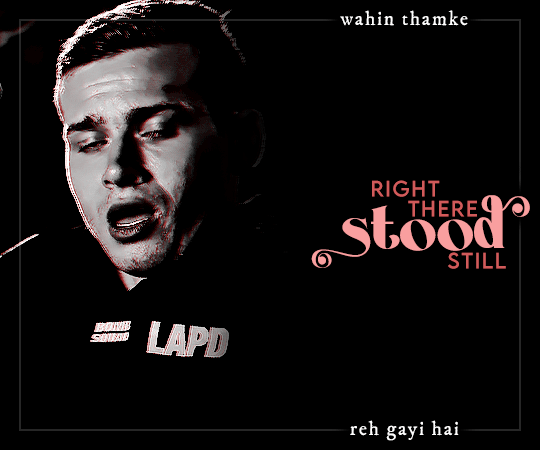

yeh chirag bhuj rahe hai, mere saath jalte jalte these flames are dying, as they burn alongside me
[Image ID: four gifs of Evan Buckley and Eddie Diaz from 911 2.01, "Under Pressure." The gifs black and white and are positioned on one side of the image, and the other side is a black gradient. In the center of the gradient is pink English translation. On the top and bottom in smaller, white text, are the original Urdu lyrics. The lyrics are from Chalte Chalte, from Pakeezah (1972):
GIF 1: Buck shifting on his heels, irritably asking Bobby, "who the hell is that." The original lyric reads, "yun hi koi mil gaya tha." and the English translation reads, "i met someone by chance."
GIF 2: Eddie tugging his shirt over his torso. The original lyric reads, "sar-e-raah chalte chalte." and the English translation reads, "walking along the path."
GIF 3: Buck ducking his head after Eddie calls him a badass under pressure, saying "really?". The original lyric reads, "wahin thamke reh gayi hai" and the English translation reads, "right there stood still."
GIF 4: Eddie's smile widening as he moves to shake Buck's hand as they agree to have each other's backs. The original lyric reads, "meri raat dhalte dhalte" and the English translation reads, "This night of mine, fading."
/end ID]
#zee edits#evan buckley#eddie diaz#buddie#911 on fox#911onfox#911 abc#911edits#911edit#blackandwhiteedit#userpinked#usernymika#userisha#userdahlias#tusercole#useralie#userabs#usersonny#userceecee#userrin#song: chalte chalte
202 notes
·
View notes
Photo

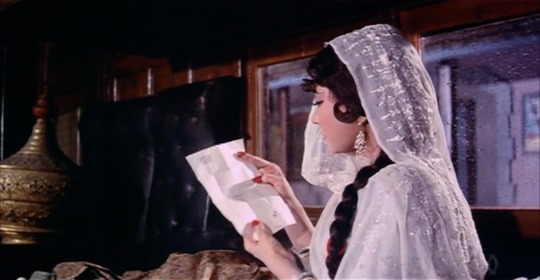
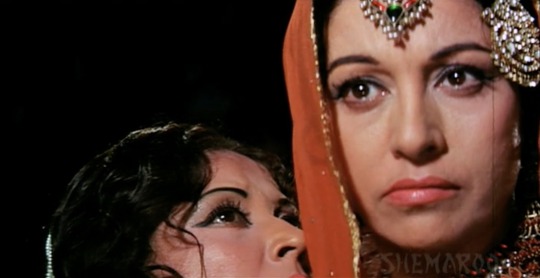


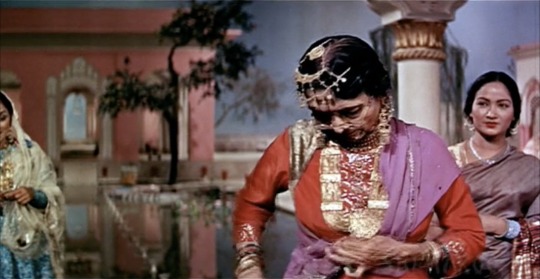
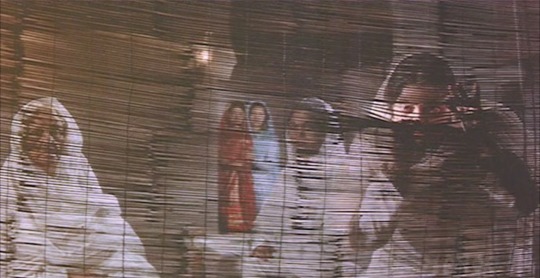

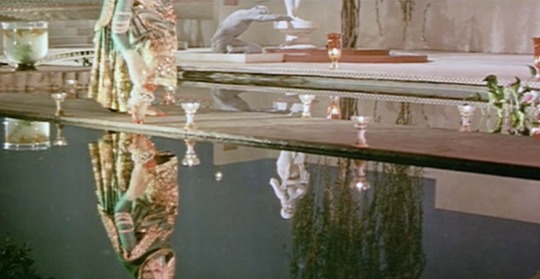

pakeezah (1972)
76 notes
·
View notes
Text

Pakeezah (1972), India
71 notes
·
View notes
Text
qala and the style over substance argument
so, i watched qala (dir. by anvita dutt) immediately when it came out - a story that exposed the music industry and the position of women in it, especially focusing on the toxic nature of indian classical music? it was like they made the film for me (someone who's spent a good chunk of their life trained in hindustani classical music). however, i was sorely disappointed.
in essence, qala, along with other films that did commercially well that came out in bollywood last year, solidified my understanding that the audience of today's generation of movie-watchers genuinely puts style over substance and in fact, uses it as a way to defend their favourite movies from criticism. the recent resurgence of praise for om shanti om of all films, only strengthened this opinion.
my criticisms for qala are in plenty, yet i will choose to expand on the ones that strike out the most to me, all of which range from the lightest to the harshest criticism:
the choice of music
the acting
the direction + writing
the handling of the serious issues that are the main theme of the film
before you read ahead, please know that there are spoilers.
in indian classical music, there are two distinct forms: hindustani (or, north indian) and carnatic (or south indian) music. each have their differences and similarities and even someone who hasn't trained can tell them apart upon listening. within hindustani music - which is the genre of music that qala learns from her mother - you have many different styles of singing, ranging from shastriya sangeet (classical form of singing) to laghu sangeet (semi-classical and sometimes, light music). of course, this categorization also has its roots in religion and caste. shastriya sangeet has forms of singing like dhrupad (the oldest form and a strictly devotional medium), khyal (the most common one, telling tales or speaking of human emotions), bhajan (also a devotional medium), etc.
laghu sangeet has forms of classical music like the thumri, a form of singing popularized and invented by courtesans. the lyrics were sensual, romantic and more explicit. of course, owing to these, they were looked down upon. even the british had a huge role in diminishing the status of indian women performers. the "other woman" concept was specifically one that they propagated and the rise of the "perfect housewife" phenomena began since the seventeenth century. the extreme effect of that? the courtesans lost out on their patrons and were forced into prostitution.
hence, that was the primary history behind qala's mother, urmila, shaming her into never being a performer, i.e, in a more derogatory term, a "singing girl". a courtesan, essentially. which is accurate, considering the film is set in the 1940s. if a girl was too "out there in the world", i.e, her achievements being publicised in newspapers or her getting recognition for her academics, her future marital prospects were ruined. and the "shame" that befell the family if she was learning music or dance was worse. a significant number of the prominent female musicians that emerged from this era of pre-independence to post-independence were unmarried. or they had many patrons and salacious rumours regarding their love life were in plenty. the film pakeezah (1972) explores such themes quite well. and the many renditions and retellings of devdas also serve as a good example of the stature of performing women.
however, it's the music itself where it goes wrong for me. the choice of songs as well as qala's singing (of course, all of qala's songs are sung by the amazing sireesha bhagavatula), is in a style all too similar to laghu singing. the years of egregious training, no matter how much her mother dismissed her, would've developed a voice which would've sounded a lot more like what a lot of classical singers would sound like, unless they were singing a lighter form of singing. and it isn't a matter of pitch or using falsetto. qala's mom is referred to as a master of qawallis, which is a sufi form of devotional singing (and comes well under hindustani music too). even the lyrics of qala's songs, while full of very obvious foreshadowing, do not match the overall orthodox classical upbringing that the film portrays.
while bhagavatula has an amazing voice well versed in classical music (especially since she sings bhajans so often), considering the time that qala was set in, you would've expected a sound similar to something along the lines of noor jehan or even roshan ara begum. instead, it sounds a lot like a mix of semi-classical instrumental with a more pop-based voice. which is easier for our generation to digest and consume, however, it comes at the cost of a sound which is very typical of the 50s-70s era of bollywood.
one that qala does right are the costumes. they do their job well. not the sets as much, which i will get into later. at some points, they are well in line with the rest of the era of the film, other times it just sticks out like a sore thumb. here's where the "symbolism" comes in.
one of the most jarring examples is the song qala sings at the first performance, a very light classical song just by the sound of the vocals. even the song jagan sings is very contemporary at its core. despite the characters having an allegedly strict, traditional schooling of music (jagan's voice is devoid of the typical heavy accent or dialects that those who are from underprivileged backgrounds tends to have), the songs at hand present a very modern take on qawallis, despite bollywood being a flourishing ground for many iconic qawallis. therefore, the compositions sometimes falter at some points specifically because of the vocal choices. choosing to do away with alaaps, especially in qala's part, less aakar and more bariki, are all signficant details that feel jarring to someone who's lived in the world of classical music as long as qala. otherwise, there are some signature sounds retained from the era that the film is set in.
and while still on the topic of singing, a very important issue that i find least addressed is the acting of it. despite there being little vocal variations in the compositions, the actors don't show that they are singing. and in the film specifically revolving around music, that's an extremely important detail that i find amiss. hardly opening the mouth, the movement of the lips, the posture as well as the hand gestures (yes, a very important detail!), are all obvious flaws. a recent film that does that does those details well is the disciple (2020). the first scene of urmila teaching qala singing displays urmila wearing an elaborate piece of nose jewellery that covers half of her mouth, and that's when they're doing rehyaas (practice), not a performance. it's huge details like these that don't sell the film to me.
the acting is quite underwhelming and here is where disagreements with my opinions might enter. i find trupti dimri's rendition of qala extremely, for lack of politer words, exasperating. she tends to show the same expressions for all of her problems, i.e., there is no great difference between her feeling anger or feeling despair or feeling depressed or feeling cheated or just plain exhaustion. qala's character is a complex one and difficult to act, which is a concession i will give, however, the hype around her is a little unnerving when the audience is given such an unremarkable delivery of dialogues and emotion. it comes off as school-play acting at times. swastika mukherjee, who plays urmila, is quite two-note with her acting, which sometimes suits her character and sometimes just feels very low-effort. babil khan has his moments, yet there is such less versatility. you'd think the babil of qala's hallucinations and the one who existed in real life would have some distinct characteristics (which they do), but they never come off as that. it feels so half-hearted at times.
the whole point of symbolism is that it's subtle at heart and not on the face. qala has on-the-face symbolism, which is an irony in itself. the black swan scene, the frosty room in the beginning, the ghostly jagan, etc. almost made me bump my nose into a wall. it comes off as pretentious at best, as if the viewer is stupid. it is also very off-putting in some scenes. for example, the black swan scene - there is very little buildup and it feels very predictable in the sense that "it all goes downhill from here". however, there is one scene which i like, which is the gargoyle one (a very traumatic scene, for those who recall, it is the one right before ghodey pe sawaar gets recorded for the final time). i think that is the most effective filmmaking in the entire film. the best thing about symbolism is always the subtlety. it makes the viewer keep coming back to pick up on something they might have missed in the first watch, it helps them pick up the pieces along the way instead of being able to tell the twists thirty minutes before they are revealed.
and one of the most egregious crimes of the entire film is the direction. here is where we get a little more technical (but just briefly, do not worry). the way it cuts from one scene to the next is like watching a poorly edited reel put out by the team of an out-of-touch marketing firm. the editing could have been better at many places. the writing falls flat specifically when it comes to the characters. i'm pretty sure on paper, the script must've been a delight to read. the story has so much potential - considering that it's based on two books, where there might've been even more depth given to the characters - it isn't new in any way but it offers a different, feminist perspective of the indian music industry. yet, the characters are paper thin on screen - in their ambitions, psychology and sociology. hence, urmila suddenly turning a new leaf in the last ten minutes of the film is something that feels wrong, because all along, she has been portrayed as a heartless mother. qala's actions make sense because her character has nearly always been rooted in self pity and rage. jagan is nothing without music. there is very little dimension to them apart from me summarizing their characters in one sentence with less than thirty words each.
that is why, the film feels even more half-hearted when it speaks of the issues that it centers around. all of these elements add up and make for a tiring watch. i gave qala a second chance, to be fair and omitted some of my pettier criticisms, yet the more serious ones remain. to a certain extent, it does aestheticize depression, which i have a huge issue with. however, baby steps as always with bollywood. it's no dear zindagi considering it is set in a different period with a different ending. however, the writing of the characters could've been so much better. a little more exploration of urmila's intentions would've given her so much depth. a few more interactions between qala and jagan might've given qala the chance to befriend him and not just see him a rival, thus intensifying the decision she took. the characters do not feel human, they are strictly white or black and qala being the anti-hero feels very off since it requires better writing and a stronger plot. and of course, much better acting.
however, qala re-opened up discussion of a nearly-always forgotten discourse - that of the position of women in music. and for achieving that bare minimum, i give it full credit. however, when there have been films with much better writing, characterization and cinematography in bollywood itself, with a similar theme, qala needs to be seen for what it contains than what it displays. just because it glitters, doesn't mean it's gold.
#qala#qala film#qala bollywood#bollywood films#bollywood ott#ott films#tripti dimri#anvita dutt#bimal khan#swastika mukherjee#qala film review#harsh critique#style over substance#i apologize in advance if i went overboard#i really#really tried to be as objective as possible#do i want more female directors? yes i do. but will i say i dont like a female directed movie if i dont like it? yes i will.#i really like dutt's bulbul and dimri was better in that#but qala is definitely a weaker direction#i hope both of them improve bc i like the films dutt has written#dimri has potential too#maits.txt
31 notes
·
View notes
Text
yunhi koi mil gaya tha yunhi koi mil gaya tha
यूँ ही कोई मिल गया था यूँ ही कोई मिल गया था
i met someone by chance


sare-raah chalte chalte sare-raah chalte chalte
सर ए राह चलते चलते सर ए राह चलते चलते
while walking,walking around the path



wahin tham ke reh gayi hai wahin tham ke reh gayi hai
वहीं थम के रह गई है वहीं थम के रह गई है
right there it stood still
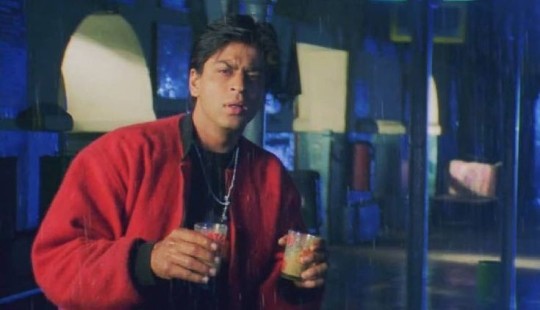
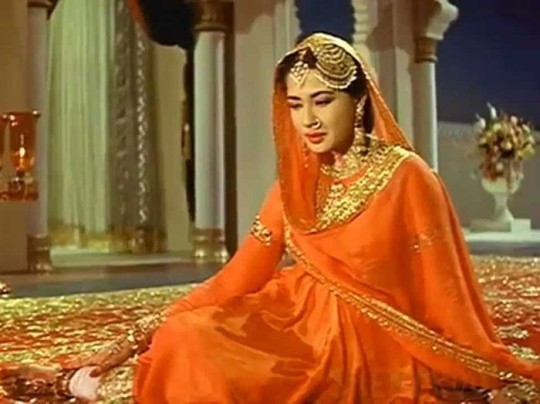
meri raat dhalte dhalte meri raat dhalte dhalte
मेरी रात ढलते ढलते मेरी रात ढलते ढलते
this night of mine,which was about to fade away
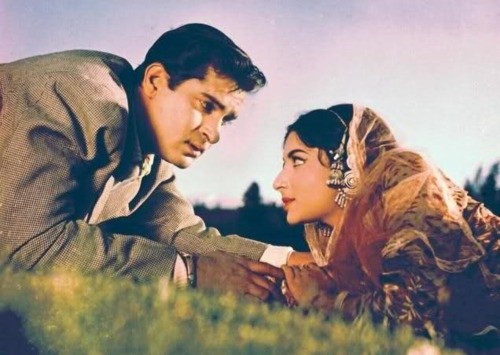


- pakeezah,1972
Lata Mangeshkar | Ghulam | Mohammad | Kaifi Azmi
#pakeezah#desi tumblr#bollywood#desiblr#desi tag#desi academia#hindi song lyrics#old bollywood#indian academia#desi dark academia#shah rukh khan#meena kumari#shahid kapoor#sharmila tagore#kareena kapoor#shammi kapoor#preity zinta#katrina kaif#hrithik roshan#dev anand#waheeda rehman#irrfan khan#tabu#j#kajol
52 notes
·
View notes
Photo


Pakeezah (1972)
44 notes
·
View notes
Text

Remembering #KamalAmrohi on his 31st death anniversary (11/02/93).
As a director, he developed a style that combined a stylised direction with minimalist performances. This style was different from the one with expressive acting that was common in the Indian cinema of his period.
Kamal Amrohi was born in Amroha, which was part of British India and is now in Uttar Pradesh, India. He changed his name to Kamal Amrohi later. He was related to two Pakistani writers, Jaun Elia and Rais Amrohvi, as their first cousin. In 1938, Kamal left his hometown to study in Lahore, which is now in Pakistan. There, a singer named K. L. Saigal found him and brought him to Mumbai to work in films. He started his film career at Sohrab Modi's film company, Minerva Movietone, and worked on movies like "Jailor," "Pukar," and "Bharosa."
Kamal Amrohi became a film director in 1949 with his first movie "Mahal," which had famous actors Madhubala and Ashok Kumar. This movie was known for its music. He directed only four movies in total, including "Daaera" with Meena Kumari and Nasir Khan, and "Pakeezah," which took a long time to make and was released in 1972. "Pakeezah" is considered a special movie in India, even though it had some flaws. Meena Kumari, who was a famous actress and Kamal's wife, praised "Pakeezah" as Kamal's tribute to her. His last movie was "Razia Sultan" in 1983. He also started making a film called "Majnoon" but it was never finished.
Kamal Amrohi also wrote scripts for other directors and was one of the writers for the famous movie "Mughal-e-Azam" in 1960, which won him an award. His style of directing was known for being different and unique, focusing more on the visual style and less on dramatic acting.
In 1958, he opened a studio named Kamaal Studios, but it closed after three years. He had planned to make another movie called "Aakhri Mughal" but it was never made. Film maker J P Dutta wanted to make this movie in the late 1990s and again in 2007, but it didn't happen. Kamal Amrohi died on February 11, 1993, in Mumbai, 21 years after his wife, Meena Kumari, passed away. He was buried next to her in Mumbai.
Six days after he died, a newspaper in the UK called The Independent wrote about him, saying he was a big figure in the Hindi film industry for over 50 years.
2 notes
·
View notes
Text




Pakeezah (1972) | dir. Kamal Amrohi
#pakeezah#pakeezah 1972#kamal amrohi#indian cinema#hindi cinema#bollywood#cinema#movies#films#world cinema#classic cinema#old bollywood#1970s#cinematography#south asian cinema#asian cinema#indian movies#hindi movies#bollywood movies#bollywood films#indian films#hindi films#classic bollywood#aesthetics#aesthetic#cinephile
180 notes
·
View notes
Text
Meena Kumari in “Chalte chalte yunhi koi” (“Pakeezah”, 1972)
youtube
Meena Kumari (1933-1972), one of the greatest Indian actresses of the last century, in an iconic scene and song from the classic Indian movie Pakeezah (The Pure One-1972, written, directed, and produced by Kamal Amrohi).
Meena Kumari plays in this movie Sahibjaan, a tawaif. The tawaifs were courtesans who catered to the nobility of the Indian Subcontinent in the Mughal and post-Mughal eras and were trained in music, danse, theater, and Urdu literature. An orphan, Sahibjaan lives since her childhood in a kotha (brothel), but she wants to escape from her fate.
According to the website of the University of Iowa ( https://indiancinema.sites.uiowa.edu/pakeezah ):
““I’ve seen your feet; they’re very lovely. Don’t set them down on the earth—they’ll get soiled.” This metaphorical warning-note, penned by a romantic stranger and left between the toes of a sleeping woman in a railway compartment, forms a much-underscored motif in this classic courtesan film—the final collaboration between the great actress and dancer Meena Kumari and her former husband, actor and director Kamal Amrohi. Like MOTHER INDIA, this film coexists with its own legend involving the offscreen lives of the director and star, who planned it together in the late 1950s but whose marriage broke up around the time that filming began in 1964. Kumari (who was also a talented Urdu poet under the pen name Naaz) then purportedly became an alcoholic, but eventually came back to complete the film shortly before her premature death in 1972; aficionados may try their luck at identifying—from Kumari’s pained and sometimes mask-like face—which scenes were shot when. The central theme of the film is the struggle for respectability of a tawai’if, an Indo-Islamic courtesan trained in poetry, music, and dance—a glamorous “public woman” whose career was to be an elegant companion (and potential lover) to affluent men, but for whom a “respectable” marriage and home was out of the question. Her beautiful feet—apart from being an erotic fetish—represent her mastery of the art of North Indian classical dance or Kathak, which tawai’if’s preserved and nurtured for several centuries. The “earth” that such feet must perforce touch, however, is ruled by patriarchal society with its crippling double-standards, which decreed that respectable women (who lived in parda or seclusion) could seldom be interesting to men, and that interesting women were seldom respectable. All courtesan fiction struggles with this divide, which forms a principal theme of one of the earliest and most famous Urdu novels, Mirza Mohammed Hadi Ruswa’s UMRAO JAN ADA (1905; itself later filmed several times; see notes on UMRAO JAAN). PAKEEZAH offers another variation on the theme.”
See also about Pakeezah the paper of Richard Allen and Ira Brashkar Pakeezah: Dreamscape of Desire, on https://www.academia.edu/36264030/Pakeezah_Dreamscape_of_Desire
In the iconic scene of this video Sahibjaan/Meena Kumari sings and dances for the “villain” of the movie, an aristocrat (Nawab) named Zafar Ali Khan (played by Kamal Kapoor), who wishes to own her. The ambiguities and dynamics of the situation and of the relationship between the two are depicted in excellent way in this scene, which takes place at the Gulabi Mahal (Pink Palace) of Luchnow. According to the paper of Allen and Brashkar:
“The Gulabi Mahal (the Pink Palace) at Lucknow evokes a more rarified atmosphere. In Amrohi’s imagination, the space of the kotha is here fused with the idea of a Greek temple where the central colonnaded performance space doubles as a space of worship to the divine feminine, and discrete spaces are orchestrated in a theatrical hierarchy from the outer court with its fountains at the entrance to the inner sanctum sanctorum, which houses the bedroom of the courtesan, essentially off limits to all but the chosen client, and separated from the main performance space by a lighted causeway between reflecting pools of water.The Pink Palace is a sublime temple of femininity, whose fountains, atriums, reflecting pools form a microcosm of artifice that rivals that of the natural world. Indeed, even the moon appears artful in this landscape and the saturated deep blue sky, a studied backcloth to the whole.”
But, as the same article continues a bit further, the Pink Palace is also a prison for Sahibjaan:
“Meanwhile, for Sahibjaan whose desire for self-fulfillment has been awakened, the Pink Palace becomes a prison. In a metaphor that recurs in the film, and echoes throughout the genre, she is likened to a bird in a gilded cage from which she yearns to escape...
...The quality and texture of her performances for him [the Nawab] are now markedly different from her earlier ones. Gone is the vivacity and vibrancy of an Inhin logon ne or a Thade rahiyo as she mournfully sings the haunting Chalte Chalte, which articulates her desire for freedom and happiness.Yet it also returns us to the pathos of her entrapment in a manner that evokes the equation of the courtesan and the flickering flame that opens the film. At the conclusion of the performance, as she sings Yeh chiraag bujh rahein hain / Mere saath jalte jalte (These lamps are fading / As they burn with me), she hears the screech of a train whistle. It is impossible initially to discern whether it is somewhere physically off-screen or within her mind.The camera cranes upward from the floor to the red chandelier, recalling the red aalta of her feet.The lights darken as the escalating screech of the train whistle resounds through the performance space, taking over the song and abruptly bringing the dance to an end. When the camera cranes down again, the dancers have disappeared from the floor.The camera then tracks forward towards the fountains that abruptly stop playing as the whistling ends. It is as if the space in which she dwells, her erstwhile tomb, is now cut to the measure of her desire. She rushes to the balcony to see the train she has seen before, but this time it is motionless, silhouetted against the sky, almost as if waiting for her to come to her balcony before it can leave.Though real, the train appears as if in a vision, so detached is the spectacle from the space she inhabits.What is finally required for Sahibjaan to escape her sealed world is a transformation of environment and character of a magnitude that challenges the tone in which the film has hitherto been cast.”
The lyrics of Chalte chalte yuhni koi were written by the Urdu poet Kaifi Azmi (1919-2002) and its music was composed years before the release of Pakeezah by Ghulam Mohammed (1903-1968). Although Meena Kumari was also a singer, the voice in the song is of the great Indian singer Lata Mangeshkar (1929-2022).
Unfortunately I couldn’t do anything with the advertisements at the end of the video.
I have found on the net the following transliteration and translation of the lyrics of Chalte chalte yuhni koi:
Chalte chalte, chalte chalte While walking, while walking
Yun hi koi mil gaya tha I met someone by chance
Yun hi koi mil gaya tha I met someone by chance
Sare raah chalte chalte Walking around the path
Sare raah chalte chalte Walking around the path
Wahin thamke reh gayi hai Right there it stood still
Wahin thamke reh gayi hai Right there it stood still
Meri raat dhalte dhalte This night of mine, which is fading away
Meri raat dhalte dhalte This night of mine, which is fading away
Joh kahi gayi na mujhse What I was unable to say
Joh kahi gayi na mujhse What I was unable to say
Woh zamaana keh raha hai The world is saying that
Woh zamaana keh raha hai The world is saying that
Ke fasana A story
Ke fasana ban gayi hai A story has been created
Ke fasana ban gayi hai A story has been created
Meri baat chalte chalte From those words of mine
Meri baat chalte chalte From those words of mine
Yun hi koi mil gaya tha I met someone by chance
Yun hi koi mil gaya tha I met someone by chance
Sare raah chalte chalte Walking around the path
Sare raah chalte chalte Walking around the path
Yun hi koi mil gaya tha I met someone by chance
Sare raah Around the path
Chalte chalte, chalte chalte While walking, while walking
Sare raah Around the path
Chalte chalte, chalte chalte While walking, while walking
Chalte chalte, chalte chalte While walking, while walking
Yun hi koi mil gaya tha I met someone by chance
Yun hi koi mil gaya tha I met someone by chance
Shab-e-intezaar aakhir The night of waiting
Shab-e-intezaar aakhir The night of waiting
Kabhi hogi mukhtasar bhi Will after all shorten soon
Kabhi hogi mukhtasar bhi Will after all shorten soon
Yeh chirag These lamps
Yeh chirag bujh rahe hai These lamps are dying
Yeh chirag bujh rahe hai These lamps are dying
Mere saath jalte jalte As they burn alongside me
Mere saath jalte jalte As they burn alongside me
Yeh chirag bujh rahe hai These lamps are dying
Yeh chirag bujh rahe hai These lamps are dying
Yeh chirag bujh rahe hai These lamps are dying
Yeh chirag bujh rahe hai These lamps are dying
Yeh chirag bujh rahe hai These lamps are dying
Yeh chirag bujh rahe hai These lamps are dying
Mere saath jalte jalte As they burn alongside me
Mere saath jalte jalte As they burn alongside me
Yun hi koi mil gaya tha I met someone by chance
Yun hi koi mil gaya tha I met someone by chance
Sare raah chalte chalte Walking around the path
3 notes
·
View notes
Text
INDIES TOP 1036 BOLLYWOOD MUSIC ALBUMS OF ALL TIME!
1. .Pakeezah (1970)
2. .Kaagaz Ke Phool (1959)
3. .Aradhana (1969)
4. .Kati Patang (1970)
5. .Safar (1970)
6. .Amar Prem (1970)
7. .Prem Kahani (1975)
8. .Do Raaste (196 )
9. .Anand (1971)
10. .Prem Nagar (1974)
11. .Basant Bahar (196 )
12. .Babul (1950)
13. . Barsaat (1949)…
14. .Bambai Ka Babu (196 )…
15. .Pyaasa (1957)
16. .Uran Khatola (1955)
17. .Asli Naqli (196 )
18. .Shahjehan (1946)
19. .Nau Do Gyarah (1957)…
20. .Disco Dancer (1982)
21. .Ek duuje ke Liye (198 )
22. .Parakh (1960)
23. .Daag: A Poem of Love (1973)
24. .Bhabhi (1957)
25. .Teesri Manzil (1966)
26. .Sachcha Jhutha (1969)
27. .Guide (1965)
28. .CID (1956)….
29. .Love Story (1981)...
30. .Anurodh (197 )
31. .Aap Ki Kasam (1974)
32. .Baharon ke sapne (1967)
33. .Souten (1983)
34. .Mehboob ki Mehndi (1971)
35. .Saraswatichandra (196 )
36. .Jis desh mein Ganga behti hai (195 )
37. .Madhumati (1958)
38. .Tansen (1943)
39. .Do Aankhen Barah Hath (195 )
40. .Shirdi ke Sai Baba
41. .Dil Diya Dard Liya (196 )
42. .Satyam Shivam Sundaram (1978)
43. .Mughal-e-Azam (196 )
44. .Anari (195 )
45. .Namak Haraam (1973)
46. .Dil Ek Mandir (1963)
47. .Seema (195 )
48. .The Train (1970)
49. .Haathi Mere Saathi (1971)
50. .Joru Ka Ghulam (197 )
51. .Bandini (1963)
52. .Bawarchi (1971)
53. .Dil Apna Aur Preet Parai (196 )
54. .Saagar (1985)
55. .Ek Dil Sau Afsane (1963)
56. .Apna Desh (1972)
57. .Mela (1948)
58. .Pyar Mohabbat (1966)
59. .Solva Saal (1958)
60. .Dr. Vidya (1962)
61. .Chalti Ka Naam Gaadi (1958)
62. .Dil Hi To Hai (1963)
63. .Dushmun (1971)
64. .Tyaag (1977)
65. .Mere Jeevan Saathi (1972)
66. .Ganga Jumna (1961)
67. .Kala Pani (1958)
68. .Hum Dono (1961)
69. .Naya Daur (1957)
70. .Sanjog (1960)
71. .Chaudhvin ka chand (1960)
72. .Anuraag (1972)
73. .Teen Devian (1965)
74. .Teesri Kasam (196 )
75. .Taj Mahal (196 )
76. .Son of India (196 )
77. .Kismet (1943)
78. .Junglee (1961)
79. .Kathputli (1957)
80. .Tere Ghar Ke Saamne (1963)
81. .Anupama (196 )
82. .Aakraman (1975)
83. .Bundalbaaz (1976)
84. .Aavishkar (1974)
85. .Jab Pyar Kisise Hota hai (1961)
86. .Mahal (1949)
87. .Kabhi Kabhie (1977)
88. .Bhai Bhai (195 )
89. .Rani Rupmati (195 )
90. .Jai Santoshi Maa (197 )
91. .Aan Milo Sajna (197 )
92. .Waqt (196 )
93. .Mera Saaya (1966)
94. .Love Marriage (1959)
95. .Samadhi (1972)
96. .Chandni (198 )
97. .Aag (1948)
98. .Musafir (1957)
99. .Tarana (1950)
100. . Silsila (198 )
101. .Aandhi (197 )
102. .Albela (1951)
103. .Prince (1969)
104. .Pagla Kahin Ka (1970)
105. .An Evening In Paris (1967)
106. .Chhote Sarkar (1974)
107. .Preetam (1971)
108. .Dillagi (1949)
109. .Hatyara (1977)
110. .Ajnabee (1974)
111. .Anokhi Raat (1968 )
112. .Mehbooba (1976)
113. .Dil Daulat Duniya (1972)
114. .Duniya (1968)
115. .Paraya Dhan (197 )
116. .Naukri (1978)
117. .Lamhe
118. .Saajan (1969)
119. .Mera Naam Joker (1970)
120. .Kashmir Ki Kali (1964)
121. .Lal Kunwar (1952)
122. .Pyar Kiye Jaa (196 )
123. .Kinare Kinare (1963)
124. .Aashiq (1962)
125. .Mukti (1977)
126. .Boot Polish (1954)
127. .Shree 420 (1955)
128. .Phagun (1958)
129. .Dil deke dekho (195 )
130. .Parichay (197 )
131. .Khamoshi (1969)
132. .Nagin (1954)
133. .Aa Gale Lag Jaa (1973)
134. .Himalay Ki God Mein (1965)
135. .Jaagte raho (195 )
136. .Prem Pujari (197 )
137. .Bombay (1995)
138. .Mere Sanam (196 )
139. .Sargam (197 )
140. .Daag (1952)
141. .Professor (196 )
142. .Gambler (1971)
143. .Tumse Achha Kaun Hai (1969)
144. .Tinku (1977)
145. .Yahudi (1958)
146. .Nikaah (198 )
147. .Lal Patthar (196 )
148. .Dhanwan (1981)
149. .Prem Bandhan (1979)
150. .Ziddi (1948)
151. .Mera Desh Mera Dharam (1973)
152. .Manoranjan (1974)
153. .Talash (1969)
154. .1942 A Love Story
155. .Raja Rani (1973)
156. .Bluff Master (1963)
157. .Ishk Ishk Ishk (1974)
158. .Munimji (1955)
159. .Andaz (1949)
160. .Bhola Bhala (1978)
161. .Maryada (197 )
162. .Brahmachari (1968)
163. .Loafer (1973 )
164. .Andaz (1971)
165. .Amar Deep (1979)
166. .Avtaar (1983)
167. .Maha Chor (1976)
168. .Rajput (1981)
169. .Jewel Thief (1967)
170. .Roti (1974)
171. .Sazaa (1951)
172. .Hare Rama Hare Krishna (1971)
173. .Khel Khel Mein (1975 )
174. .Banarasi Babu (1973)
175. .Waris (1969 )
6 notes
·
View notes
Photo
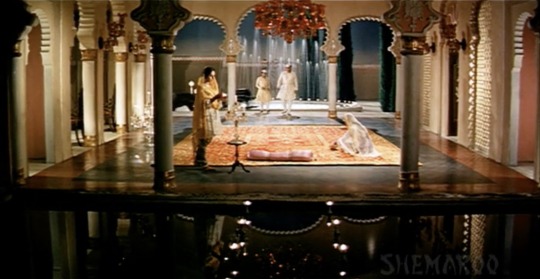

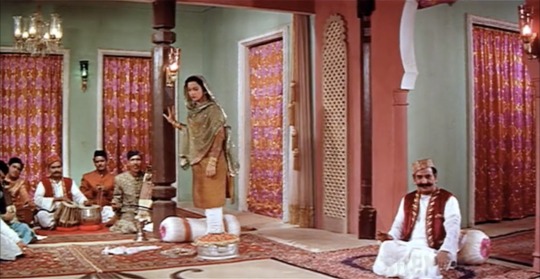
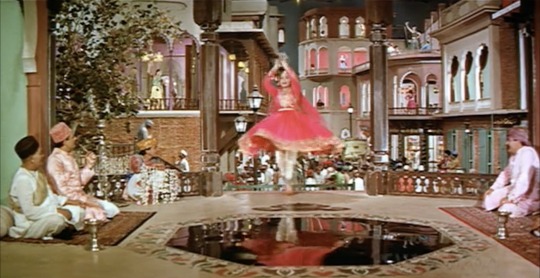


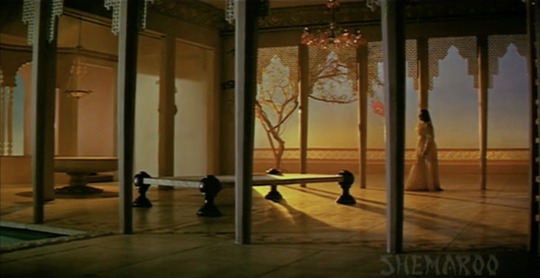

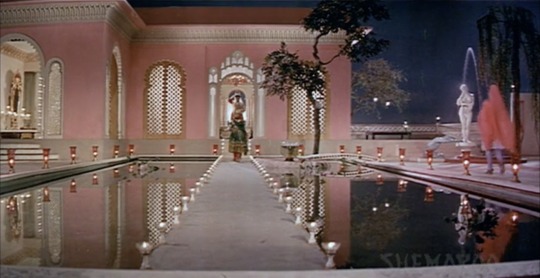

the sets of pakeezah (1972)
#so gorgeous and extravagant#pakeezah#meena kumari#interior design#set design#architecture#indian architecture
93 notes
·
View notes
Text

Pakeezah (1972), India
122 notes
·
View notes
Text
Drawing Inspiration from Meena Kumari: Sharmin Segal’s Journey in Heeramandi
Actor Sharmin Segal, who has been in the spotlight since the release of Heeramandi: The Diamond Bazaar, has shared insights into the preparation and challenges she faced for her performance in the Sanjay Leela Bhansali web series. In a recent interview, Sharmin revealed that she drew inspiration from Meena Kumari’s iconic role in Pakeezah (1972) to bring depth to her portrayal of the tragic…

View On WordPress
0 notes
Video
youtube
चलते चलते यूँ ही कोई | Chalte Chalte Yun Hi Koi | Pakeezah (1972) | Meen...
0 notes